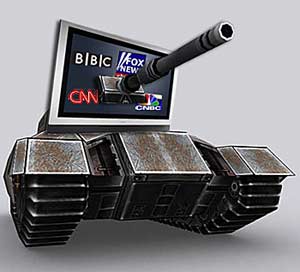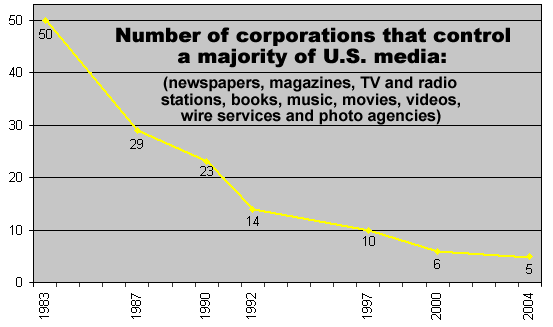7 Reasons the MSM
Why There Is So Much Pro-War Reporting?

American media is always pro-war:
Can you name a single paper, or a single TV network, that was unequivocally opposed to the American wars carried out against Libya, Iraq, Afghanistan, Yugoslavia, Panama, Grenada, and Vietnam while they were happening, or shortly thereafter? Or even opposed to any two of these seven wars? How about one?
In 1968, six years into the Vietnam War, the Boston Globe (Feb. 18, 1968) surveyed the editorial positions of 39 leading U.S. papers concerning the war and found that “none advocated a pull-out.” Has the phrase “invasion of Vietnam” ever appeared in the U.S. mainstream media?
In 2003, leading cable station MSNBC took the much-admired Phil Donahue off the air because of his opposition to the calls for war in Iraq.
Why?
There are seven reasons that the mainstream media and many of the largest “alternative” media websites are all pro-war.
Myths, Misunderstandings and Outright lies about owning Gold. Are you at risk?
1. Self-Censorship by Journalists
There is tremendous self-censorship by journalists.
A survey by the Pew Research Center and the Columbia Journalism Review in 2000 found:
Self-censorship is commonplace in the news media today …. About one-quarter of the local and national journalists say they have purposely avoided newsworthy stories, while nearly as many acknowledge they have softened the tone of stories to benefit the interests of their news organizations. Fully four-in-ten (41%) admit they have engaged in either or both of these practices.
Similarly, a 2003 survey reveals that 35% of reporters and news executives themselves admitted that journalists avoid newsworthy stories if “the story would be embarrassing or damaging to the financial interests of a news organization’s owners or parent company.”
Several months after 9/11, Dan Rather told the BBC that American reporters were practicing “a form of self-censorship”:
There was a time in South Africa that people would put flaming tires around peoples’ necks if they dissented. And in some ways the fear is that you will be necklaced here, you will have a flaming tire of lack of patriotism put around your neck. Now it is that fear that keeps journalists from asking the toughest of the tough questions…. And again, I am humbled to say, I do not except myself from this criticism.
What we are talking about here – whether one wants to recognise it or not, or call it by its proper name or not – is a form of self-censorship.
Rather said in 2008:
One of the most pernicious ways in which we do this is through self-censorship, which may be the worst censorship of all. We have seen too much self-censorship in the news in recent years, and as I say this please know that I do not except myself from this criticism.
As Mark Twain once said, “We write frankly and freely but then we ‘modify’ before we print.” Why do we modify the free and frank expression of journalistic truth? We do it out of fear: Fear for our jobs. Fear that we’ll catch hell for it. Fear that someone will seek to hang a sign around our neck that says, in essence, “Unpatriotic.”
We modify with euphemisms such as “collateral damage” or “less than truthful statements.” We modify with passive-voice constructions such as “mistakes were made.” We modify with false equivalencies that provide for bad behavior the ready-made excuse that “everybody’s doing it.” And sometimes we modify with an eraser—simply removing offending and inconvenient truths from our reporting.”
Keith Olbermann agreed that there is self-censorship in the American media, and that:
You can rock the boat, but you can never say that the entire ocean is in trouble …. You cannot say: By the way, there’s something wrong with our …. system.
Former Washington Post columnist Dan Froomkin wrote in 2006:
Mainstream-media political journalism is in danger of becoming increasingly irrelevant, but not because of the Internet, or even Comedy Central. The threat comes from inside. It comes from journalists being afraid to do what journalists were put on this green earth to do. . . .
There’s the intense pressure to maintain access to insider sources, even as those sources become ridiculously unrevealing and oversensitive. There’s the fear of being labeled partisan if one’s bullshit-calling isn’t meted out in precisely equal increments along the political spectrum.
If mainstream-media political journalists don’t start calling bullshit more often, then we do risk losing our primacy — if not to the comedians then to the bloggers.
I still believe that no one is fundamentally more capable of first-rate bullshit-calling than a well-informed beat reporter – whatever their beat. We just need to get the editors, or the corporate culture, or the self-censorship – or whatever it is – out of the way.
MarketWatch columnist Brett Arends wrote in 2013:
Do you want to know what kind of person makes the best reporter? I’ll tell you. A borderline sociopath. Someone smart, inquisitive, stubborn, disorganized, chaotic, and in a perpetual state of simmering rage at the failings of the world. Once upon a time you saw people like this in every newsroom in the country. They often had chaotic personal lives and they died early of cirrhosis or a heart attack. But they were tough, angry SOBs and they produced great stories.
Do you want to know what kind of people get promoted and succeed in the modern news organization? Social climbers. Networkers. People who are gregarious, who “buy in” to the dominant consensus, who go along to get along and don’t ask too many really awkward questions. They are flexible, well-organized, and happy with life.
And it shows.
This is why, just in the patch of financial and economic journalism, so many reporters are happy to report that U.S. corporations are in great financial shape, even though they also have surging debts, or that a “diversified portfolio” of stocks and bonds will protect you in all circumstances, even though this is not the case, or that defense budgets are being slashed, when they aren’t, or that the U.S. economy has massively outperformed rivals such as Japan, when on key metrics it hasn’t, or that companies must pay CEOs gazillions of dollars to secure the top “talent,” when they don’t need to do any such thing, and such pay is just plunder.
All of these things are “consensus” opinions, and conventional wisdom, which are repeated over and over again by various commentators and vested interests. Yet none of them are true.
If you want to be a glad-handing politician, be a glad-handing politician. If you want to be a reporter, then be angry, ask awkward questions, and absolutely hate it when everyone agrees with you.
The Jerusalem Post wrote last year:
Any university journalism course will teach that there are two forms of media censorship in the media: censorship and self-censorship. As one online article explains: “Censorship occurs when a state, political, religious or private party prohibits information from reaching citizens. Self-censorship occurs when journalists themselves prevent the publication of information… because they are fearful of what could happen if they publish certain information – they are fearful of injury to themselves or their families, fearful of a lawsuit or other economic consequence.”
***
A 2014 academic article was more alarmist in tone. M. Murat Yesil, assistant professor at Turkey’s Necmettin Erbakan University, wrote that “self-censoring practices of journalists put the future of journalism into danger… [such] practices may be threatening the future of journalism.” This past week, Spanish journalists are claiming a new law that protects police officers from having their photographs published will encourage self-censorship.
Self-censorship obviously occurs on the web as well as in old media. As Wikipedia notes:
Self-censorship is the act of censoring or classifying one’s own work (blog, book(s), film(s), or other means of expression) …
2. Censorship by Higher-Ups

Anthony Freda: www.AnthonyFreda.com.
If journalists do want to speak out about an issue, they also are subject to tremendous pressure by their editors or producers to kill the story.
The 2000 Pew and Columbia Journalism Review survey notes:
Fully half of [the investigative journalists surveyed] say newsworthy stories are often or sometimes ignored because they conflict with a news organization’s economic interests. More than six-in-ten (61%) believe that corporate owners exert at least a fair amount of influence on decisions about which stories to cover….
The Pulitzer prize-winning reporter who uncovered the Iraq prison torture scandal and the Mai Lai massacre in Vietnam, Seymour Hersh, said:
“All of the institutions we thought would protect us — particularly the press, but also the military, the bureaucracy, the Congress — they have failed. The courts . . . the jury’s not in yet on the courts. So all the things that we expect would normally carry us through didn’t. The biggest failure, I would argue, is the press, because that’s the most glaring….
Q: What can be done to fix the (media) situation?
[Long pause] You’d have to fire or execute ninety percent of the editors and executives. You’d actually have to start promoting people from the newsrooms to be editors who you didn’t think you could control. And they’re not going to do that.”
In fact, many journalists are warning that the true story is not being reported.
A series of interviews with award-winning journalists also documents censorship of certain stories by media editors and owners (and see these samples).
It’s not just the mainstream media. The large “alternative” media websites censor as well. For example:
Every year Project Censored [which Walter Cronkite and other ] puts together a list of the top 25 stories censored and ignored by the mainstream media.
How many of these stories were you aware of? Even regular consumers of alternative, independent media may be surprised to learn about some of these stories ….
There are many reasons for censorship by media higher-ups.
One is money.
The media has a strong monetary interest to avoid controversial topics in general. It has always been true that advertisers discourage stories which challenge corporate power. In 1969, Federal Communications Commission commissioner Nicholas Johnson noted that tv networks go to great lengths to please their sponsors.
Indeed, a 3-time Emmy Award-winning CNN journalist says that CNN took money from the royalty in Bahrain to kill her hard-hitting expose, and instead run flattering propaganda for Bahrain.
Some media companies make a lot of money from the government, and so don’t want to rock the boat. For example, Glenn Greenwald notes:
Because these schools [owned by the Washington P0st’s parent company, whose profits subsidize the Post] target low-income students, the vast majority of their income is derived from federal loans. Because there have been so many deceptive practices and defaults, the Federal Government has become much more aggressive about regulating these schools and now play a vital role in determining which ones can thrive and which ones fail.
Put another way, the company that owns The Washington Post is almost entirely at the mercy of the Federal Government and the Obama administration — the entities which its newspaper ostensibly checks and holds accountable. “By the end of 2010, more than 90 percent of revenue at Kaplan’s biggest division and nearly a third of The Post Co.’s revenue overall came from the U.S. government.” The Post Co.’s reliance on the Federal Government extends beyond the source of its revenue; because the industry is so heavily regulated, any animosity from the Government could single-handedly doom the Post Co.’s business — a reality of which they are well aware:
The Post Co. realized there were risks attached to being dependent on federal dollars for revenue — and that it could lose access to that money if it exceeded federal regulatory limits.
“It was understood that if you fell out of grace [with the Education Department], your business might go away,” said Tom Might, who as chief executive of Cable One, a cable service provider that is owned by The Post Co., sat in at company-wide board meetings.
Beyond being reliant on federal money and not alienating federal regulators, the Post Co. desperately needs favorable treatment from members of Congress, and has been willing to use its newspaper to obtain it:
Graham has taken part in a fierce lobbying campaign by the for-profit education industry. He has visited key members of Congress, written an op-ed article for the Wall Street Journal and hired for The Post Co. high-powered lobbying firms including Akin Gump and Elmendorf Ryan, at a cost of $810,000 in 2010. The Post has also published an editorial opposing the new federal rules, while disclosing the interests of its parent company.
The Post is hardly alone among major media outlets in being owned by an entity which relies on the Federal Government for its continued profitability. NBC News and MSNBC were long owned by GE, and now by Comcast, both of which desperately need good relations with government officials for their profits. The same is true of CBS (owned by Viacom), ABC (owned by Disney), and CNN (owned by TimeWarner). For each of these large corporations, alienating federal government officials is about the worst possible move it could make — something of which all of its employees, including its media division employees, are well aware. But the Post Co.’s dependence is even more overwhelming than most.
How can a company which is almost wholly dependent upon staying in the good graces of the U.S. Government possibly be expected to serve as a journalistic “watchdog” over that same Government? The very idea is absurd.
In addition, the government has allowed tremendous consolidation in ownership of the airwaves during the past decade.
Dan Rather has slammed media consolidation:
Likening media consolidation to that of the banking industry, Rather claimed that “roughly 80 percent” of the media is controlled by no more than six, and possibly as few as four, corporations.
This is documented by the following must-see charts prepared by:
And check out this list of interlocking directorates of big media companies from Fairness and Accuracy in Media, and this resource from the Columbia Journalism Review to research a particular company.
This image gives a sense of the decline in diversity in media ownership over the last couple of decades:
The large media players stand to gain billions of dollars in profits if the Obama administration continues to allow monopoly ownership of the airwaves by a handful of players. The media giants know who butters their bread. So there is a spoken or tacit agreement: if the media cover the administration in a favorable light, the MSM will continue to be the receiver of the government’s goodies.
The large alternative media websites also censor news which are too passionately anti-war.
Huffington Post – the largest liberal website – is owned by media giant AOL Time Warner, and censors any implication that a Democratic administration could be waging war for the wrong reasons. So HuffPost may criticize poor prosecution of the war but would never say that the entire “War on Terror” as currently waged by the Obama administration is a stupid idea.
The largest “alternative” websites may weakly criticize minor details of the overall war effort, but would never say that more or less worldwide war-fighting is counterproductive. They may whine about a specific aspect of the war-fighting … but never look at the larger geopolitical factors involved.
They all seem to follow Keith Olbermann’s advice:
You can rock the boat, but you can never say that the entire ocean is in trouble …. You cannot say: By the way, there’s something wrong with our …. system.
The post 7 Reasons the MSM appeared first on LewRockwell.

Leave a Reply